
Plestiodon egregius, the mole skink, is a species of small lizard endemic to the Southeastern United States.

The western skink is a species of small, smooth-scaled lizard with relatively small limbs. It measures about 100 to 210 mm in total length. It is one of seven species of lizards in Canada. They spend much of their day basking in the sun. Their diet ranges widely, including spiders and beetles. Western skinks will bite if grasped and will flee if they feel threatened. It is a common but secretive species whose range extends from southern British Columbia and throughout Washington, Oregon, Nevada, Utah, Idaho, and Wyoming and into western Montana and northern Arizona and Missouri. They can also live in some areas of Texas It is widespread in northern California but primarily restricted to the coast in central and southern California. Found in a variety of habitats, this lizard is most common in early successional stages or open areas of late successional stages. Heavy brush and densely forested areas are generally avoided. Western skinks are found from sea level to at least 2,130 m (7,000 ft). This diurnal reptile is active during the warm seasons.

Plestiodon anthracinus, the coal skink, is a species of lizard which is endemic to the United States.

The broad-headed skink or broadhead skink is species of lizard, endemic to the southeastern United States. The broadhead skink occurs in sympatry with the five-lined skink and Southeastern five-lined skink in forest of the Southeastern United States. All three species are phenotypically similar throughout much of their development and were considered a single species prior to the mid-1930s.

Plestiodon gilberti, commonly known as Gilbert's skink, is a species of heavy-bodied medium-sized lizard in the family Scincidae. The species is endemic to the southwestern United States and northwestern Mexico, and grows to about 7 to 12 cm in total length.
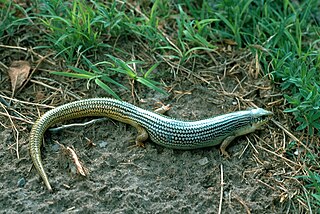
The Great Plains skink is a species of lizard endemic to North America.

The prairie skink is a species of skink endemic to the prairies east of the Rocky Mountains in North America. It is one of only seven species of lizards that occur in Canada.

The (American) five-lined skink is a species of lizard in the family Scincidae. The species is endemic to North America. It is one of the most common lizards in the eastern U.S. and one of the seven native species of lizards in Canada.

Plestiodon inexpectatus, the southeastern five-lined skink is a common skink in the southeastern United States.
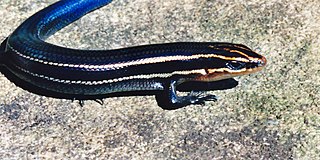
The four-lined skink is a species of lizard, which is endemic to North America. It is a medium-sized member of the Plestiodon skinks.
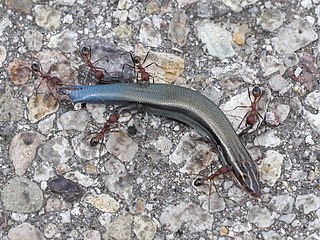
Plestiodon callicephalus, commonly known as the mountain skink, is a species of lizard, a medium-sized member of the Plestiodon skinks, endemic to North America.

Plestiodon multivirgatus, commonly known as the many-lined skink, the northern many-lined skink, or the variable skink, is a medium-sized species of lizard, a member of the North American skink genus Plestiodon in the family Scincidae. The species is native to the western United States.

The Bermuda skink, longnose skink, or (Bermuda) rock lizard is a critically endangered species and the only endemic land-living vertebrate of Bermuda. It is a relatively small skink : adults reach an average snout-to-vent length of about 8 cm (3.1 in).

Plestiodon is a genus of lizards in the family Scincidae (skinks). The genus contains many species formerly classified under the genus Eumeces, except those now placed in Mesoscincus. They are secretive, agile animals with a cylindrical body covered with smooth, shiny scales. They are distributed from East Asia to throughout North America from southern Canada south to Mexico, including oceanic islands such as Bermuda.

Plestiodon barbouri, also known commonly as Barbour's blue-tailed skink and Barbour's eyelid skink, is a species of lizard in the family Scincidae. The species is endemic to the Ryukyu Islands (Japan).
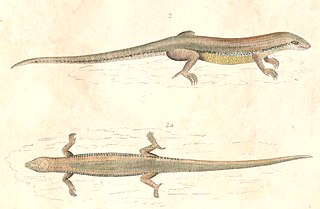
Plestiodon chinensis, the Chinese blue-tailed skink, is a species of lizard which is found in China, western Taiwan, and northern Vietnam.

Plestiodon dugesii, also known commonly as Dugès' skink, Duges's skink, and eslabon in Mexican Spanish, is a species of lizard in the family Scincidae. The species is endemic to Mexico.

Plestiodon japonicus is a species of lizard which is endemic to Japan. The IUCN lists the species as least concern.
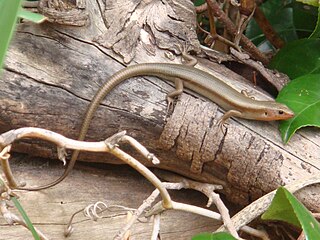
The Okada's five-lined skink or Far Eastern skink is a species of lizard which is endemic to Japan.

Plestiodon leucostictus, the Chinese blue-tailed skink, is a species of skink. It is endemic to Taiwan and occurs in the eastern part of the main island as well as on Green Island. As currently delimited, it includes Plestiodon chinensis formosensis from the eastern parts of Taiwan and Eumeces chinensis leucostictus originally described from Green Island; the taxonomic position of Plestiodon chinensis formosensis from western Taiwan is unsettled.





















